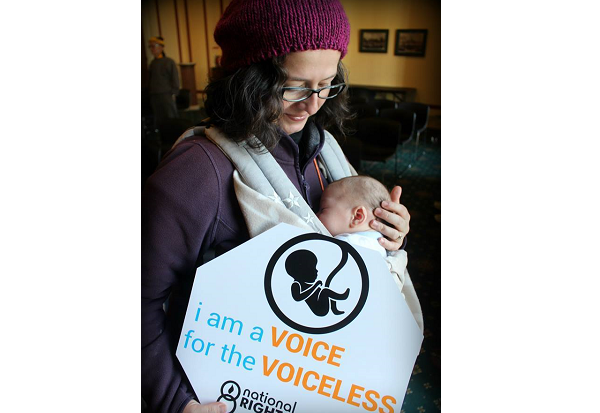By the time Derya Little was a young teenager, she was seriously questioning her Muslim faith and its treatment of women.
Her doubts, coupled with her parents’ divorce and family struggles, took her down a troubling path where she drank heavily, experimented with drugs and aborted two unborn babies. Eventually, though, Little’s life began to change when she developed a friendship with a pro-life Christian.
Little recounts her life story in her book “From Islam to Christ: One Woman’s Path Through the Riddles of God,” new from Ignatius Press. Her book gives westerners an intriguing look at the Muslim culture in Turkey, Islamic beliefs about unborn babies and women, and her conversion from Islam to atheism to Christianity.
Now a devout Catholic, wife and mother in the United States, Little grew up in a Muslim home in Turkey. Her parents divorced when she was in middle school, something still very much frowned upon in the conservative culture, and the separation deeply affected her life.
Little did not have a good relationship with either of her parents. After the divorce, she lived with her mother and brother. Her mother was quiet and distant, and she seemed to care more about how the neighbors perceived her and her children than their actual well-being.
So when Little began spending a lot of her time drinking and experimenting with drugs, her mother did not seem to care, as long as she didn’t get caught.
Little’s school friends introduced her to atheist writers and communist thinkers, and she began reading Karl Marx, Franz Kafka and Friedrich Nietzsche. She became an agnostic and later an atheist while she was in high school.
“My atheism relieved me of the burdens of conscience,” she wrote. “… Premarital sex was not an issue at all, because sex was a natural need and suppression of sexual desires leads to aggression and violence. … Abortion was not murder because a fetus is a bunch of cells and nothing more.”
Not long after she began college, Little found out she was pregnant to her boyfriend Enver. She had an abortion without thinking much about it.
“… I did not believe that it was a baby. It was just a cluster of tissues that posed a threat to my current lifestyle and especially to my future,” Little wrote. “Enver and I did not even have a discussion about it. As soon as the urine test showed positive, we made an appointment with a gynecologist who performs abortions.”
Though she no longer practiced Islam, she said her upbringing influenced her decision to abort her unborn child.
She explained:
“Islam has a vague stance regarding abortion. Even though the Quran condemns the killing of persons, except for self-defense, national defense, and capital punishment, it does not mention abortion. Since the Quran does not explicitly forbid or permit abortion, Islamic theologians have varying opinions on it. The majority of theologians permit abortion up to day 40 of pregnancy, while others allow it until day 120, when the life force supposedly enters the body.”
“… Without a clear conviction that the human person is present from the moment of his conception, Islam has no clear teaching on whether or when abortion should be permitted.”
Many Muslims oppose abortion, but abortions are legal up to 10 weeks in Turkey. Little said the abortion rate is high there, and she suspects that many cases are like her own – out of wedlock pregnancies that would cause shame and social ostracism.
Aborting her unborn child did not seem like a big deal to Little at first, but it profoundly affected her life. She said her relationship with Enver quickly deteriorated, and they eventually broke up. A few years later, she aborted a second unborn baby to her fiance, Alp. Their relationship also went downhill and ended not long after their unborn baby’s death.
About the same time as her first abortion, Little began teaching an American woman the Turkish language. She later learned that Therese was a Christian missionary. Well-educated and intelligent, Therese began to impress Little with her deeply held religious beliefs and ability to defend them.
One of the issues that came up in their discussions was abortion.
“Therese was the first pro-life person I had ever known,” Little wrote. “Her conviction about life beginning at conception was so strong and inspiring that even though I did not agree with her, I was envious of the confidence she exuded. Her unyielding position on abortion touched me deeply.”
Little said she very much wanted Therese to be wrong, but her friend defended her position with scientific facts and logic and she slowly began to see the truth.
“I wanted to dismiss her as an antifeminist, religious nut job, but the science that was my god proved that the cluster of tissues removed by an abortion has a heartbeat,” she wrote. “… I argued that women needed to have access to birth control methods, including abortion, in order to free themselves from the tyranny of men, although I knew that abortion victimized and scarred women. Even I, as a pragmatic, selfish atheist, experienced sorrow over my abortions.”
Therese’s witness eventually prompted Little to change her beliefs, and she became pro-life while still an atheist. Later, other missionaries and Turkish Christians helped lead her to Christ and eventually the Catholic Church.
Now a wife, stay-at-home mother of four and writer, Little said she is who she is today because of Jesus Christ. She said her faith has helped her to forgive herself and others for the pain in her past.
“Because of Christ’s love and mercy, every day I strive to travel onward and upward in faith and to find ways to share my faith,” she concluded. “More often than not, I fall, but then there is always more forgiveness, more graces and more love to pick me back up.”








